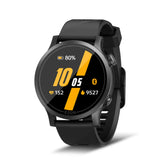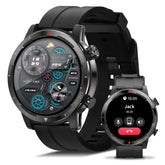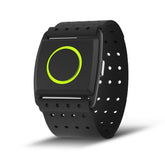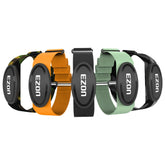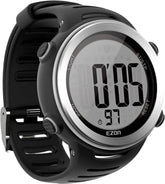Sleep Tracking and Its Impact on Fitness Recovery
Quality sleep is the cornerstone of fitness recovery, yet it’s often overlooked by athletes and fitness enthusiasts. Your body repairs muscles, balances hormones, and consolidates memory during sleep, making it as crucial as the workouts themselves. Sleep tracking provides insights into sleep quality and patterns, allowing you to optimize recovery and enhance performance. In this guide, we’ll explore how understanding your sleep can transform your fitness journey, with a focus on tools like sports watch to track and improve rest.
The Science of Sleep and Recovery
Sleep isn’t just a period of rest—it’s a dynamic process divided into stages that impact physical and mental health:
1. Light Sleep (N1/N2)
- Role: Prepares the body for deep sleep, accounting for 50–55% of total sleep.
- Impact on Recovery: Enhances cognitive functions and emotional regulation, but minimal physical repair occurs here.
2. Deep Sleep (N3)
- Role: The most restorative stage, lasting 15–25% of sleep.
- Impact on Recovery: Boosts muscle growth (via growth hormone release), repairs tissues, and strengthens the immune system. Inadequate deep sleep leads to delayed recovery and increased injury risk.
3. REM Sleep
- Role: Accounts for 20–25% of sleep, vital for brain health and memory consolidation.
- Impact on Recovery: Enhances mental sharpness and emotional resilience, critical for maintaining focus during training.
Key Metric: Sleep Quality Score
Many sports watch calculate this score by analyzing sleep stages, duration, and interruptions. A score below 70 may signal poor recovery potential.
How Sleep Tracking Enhances Fitness Recovery
1. Identify Sleep Disruptions
- Common Issues: Insomnia, restless leg syndrome, or sleep apnea (detected by sudden SpO₂ drops).
- Solution: Use a sports watch to monitor sleep patterns and adjust routines (e.g., avoiding screens 1 hour before bed, maintaining a consistent wake-up time).
2. Optimize Recovery with Heart Rate Variability (HRV)
- What It Is: HRV measures the time between heartbeats—higher HRV indicates better recovery capacity.
- How to Use It: Track HRV in the morning via your watch; a lower-than-usual HRV may signal overtraining, prompting you to add a rest day.
3. Align Training with Circadian Rhythms
- Morning vs. Evening Sleep: Some people are “larks” (alert in the morning), others “owls” (active at night). Adjust workout times to match your natural peak energy periods for better performance and recovery.
Tools for Effective Sleep Tracking
1. Sports Watches with Advanced Sensors
- Sleep Stage Analysis: Uses optical heart rate sensors and motion tracking to distinguish between light, deep, and REM sleep.
- SpO₂ Monitoring: Detects oxygen desaturation during sleep, a sign of breathing disruptions like sleep apnea.
- Sleep Quality Reports: Syncs with apps to show weekly trends, helping you identify patterns (e.g., poor sleep after high-intensity workouts).
2. Sleep Hygiene Features
- Wind-Down Reminders: Some watches send alerts to start relaxing (e.g., guided breathing exercises).
- Bedtime Mode: Disables notifications to minimize distractions, creating a sleep-friendly environment.
3. Recovery-Focused Metrics
- Resting Heart Rate (RHR): A lower RHR over time signals improved fitness, but a sudden spike may indicate insufficient sleep.
- Recovery Score: Combines sleep quality, HRV, and activity data to recommend daily training intensity (e.g., “Take it easy today”).
Strategies to Improve Sleep for Better Recovery
1. Stick to a Consistent Schedule
- Go to bed and wake up at the same time daily, even on weekends, to regulate your body’s internal clock.
2. Create a Relaxing Pre-Sleep Routine
- Avoid caffeine after 2 PM, limit alcohol (disrupts deep sleep), and engage in calming activities (reading, yoga, or listening to white noise).
3. Optimize Your Sleep Environment
- Keep your bedroom cool (60–67°F), dark (use blackout curtains), and quiet. Invest in a comfortable mattress and pillows that support your posture.
4. Limit Blue Light Exposure
- Use blue light filters on devices 2 hours before bed, as screen light suppresses melatonin production, the sleep hormone.
The Role of Sleep in Long-Term Fitness Goals
1. Injury Prevention
- Poor sleep weakens the immune system and impairs muscle repair, increasing the risk of overuse injuries like tendinitis or stress fractures.
2. Performance Enhancement
- Athletes who prioritize sleep report better reaction times, endurance, and power output, especially in high-intensity sports.
3. Mental Resilience
- Quality sleep improves focus and reduces stress, helping you stay motivated during challenging training blocks.
Choose a Sleep Tracking Tool That Works for You
- Balances Accuracy and Comfort: Lightweight design for overnight wear, with sensors that don’t interfere with sleep.
- Offers Holistic Data: Combines sleep metrics with heart rate, activity, and recovery scores for a complete picture.
- Syncs with Your Lifestyle: Integrates with popular apps (Apple Health, Google Fit) to centralize health data.
EZON’s heart rate series and sports watch series excel in sleep tracking, providing actionable insights to optimize recovery and elevate performance.
Prioritize Sleep: The Ultimate Recovery Tool
Sleep tracking is more than a feature—it’s a strategic advantage for anyone serious about fitness. By understanding your sleep patterns and using a sports watch to guide improvements, you’ll wake up ready to train harder, recover faster, and achieve goals you once thought out of reach.
Remember: progress happens not just in the gym, but in the hours you spend resting. Start tracking today, and let sleep become your secret weapon for better health and fitness recovery.
